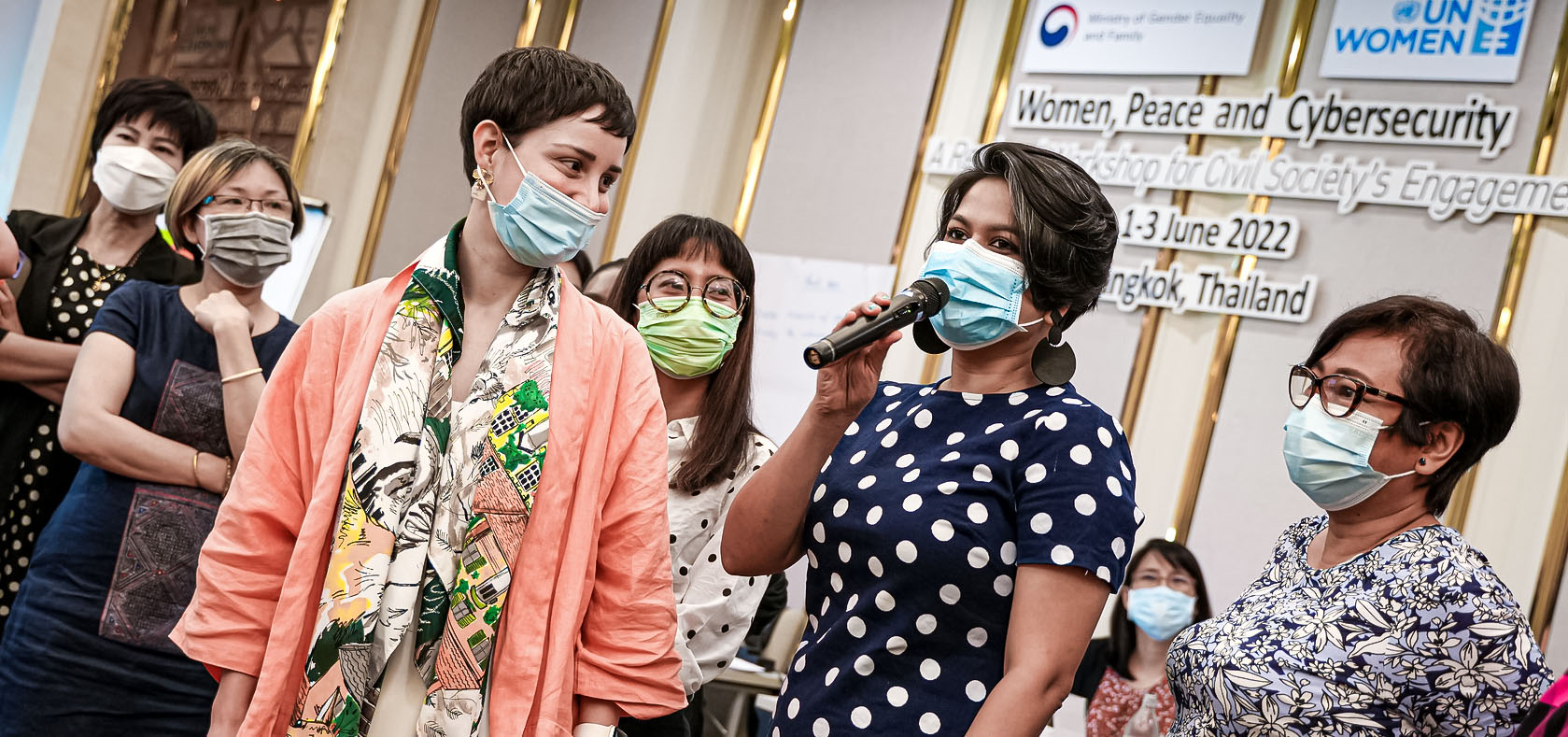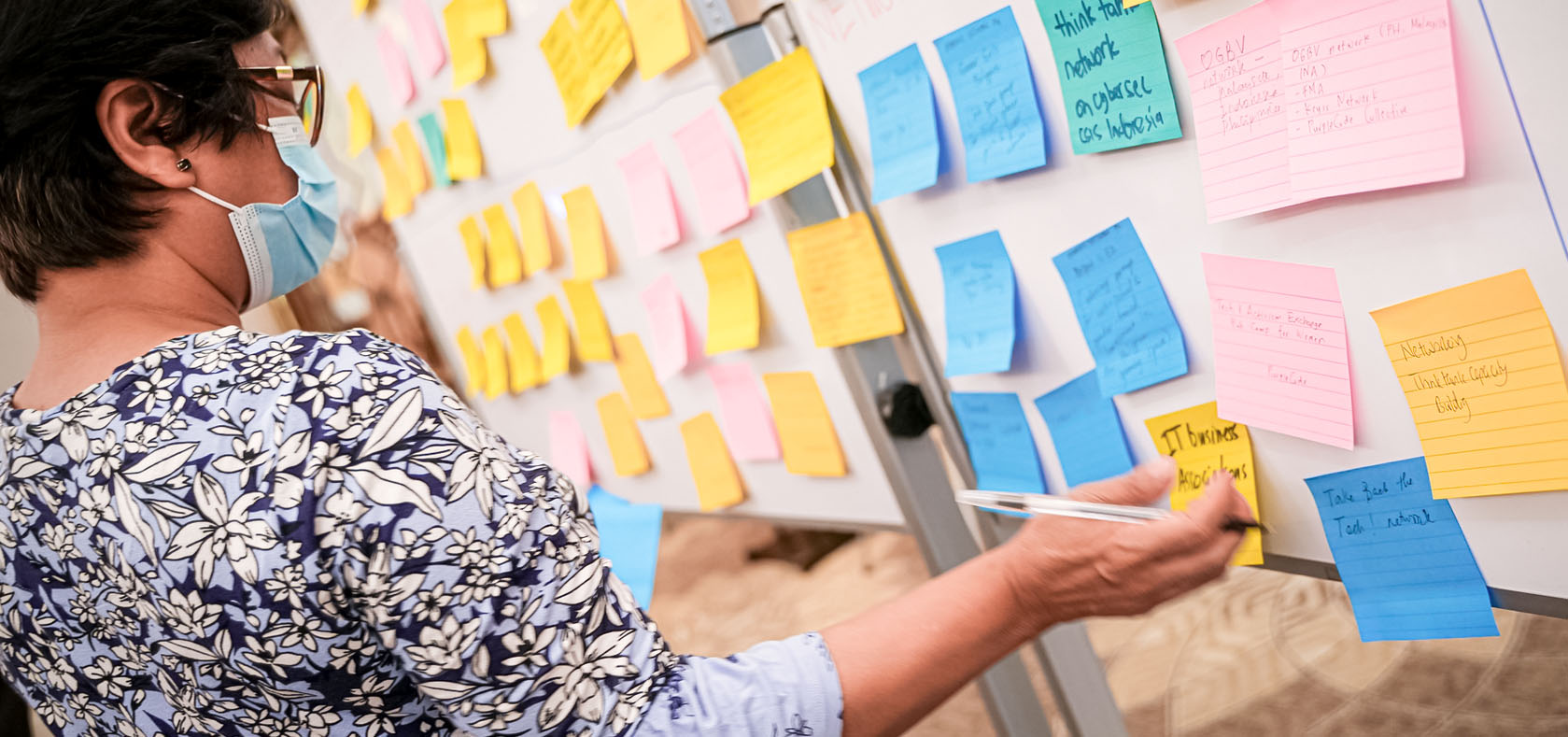UN Women Enhances Partner Organizations’ Capacities through a Women, Peace and Cybersecurity Workshop
Date:
Author: Alexandra Håkansson Schmidt

Bangkok, Thailand — Young women cyber-defenders and representatives from Women’s NGOs, digital rights organizations and think tanks from across Southeast Asia came together at the UN Women ‘Women, Peace and Cybersecurity Regional Workshop for Civil Society’s Engagement’, which was generously supported by the Government of the Republic of Korea. At the workshop, participants strengthened their knowledge and worked together to formulate strategic priorities for the design, adoption and implementation of conflict-sensitive and gender-responsive cybersecurity policies and practice.
Between 1 and 3 June 2022, young women cyber-defenders and representatives from Women’s NGOs, digital rights organizations and think tanks from across Southeast Asia participated in UN Women’s ‘Women, Peace and Cybersecurity Workshop for Civil Society Engagement’ workshop. UN Women Regional Office for Asia and the Pacific organized the workshop under the Women, Peace and Cybersecurity: Promoting Women’s Peace and Security in the Digital World programme, funded by the Government of the Republic of Korea. The workshop took place in Bangkok, Thailand, and included a total of 26 participants.
Leveraging existing expertise on gender-responsive cybersecurity and digital rights among civil society organizations in Southeast Asia, the workshop strengthened participants’ knowledge on addressing cybersecurity from a women, peace and security lens. At the collaborative workshop, participants developed an advocacy brief, provided inputs on tentative findings from UN Women’s research on gender and cybersecurity and suggested recommendations to be included in the final research report. The participants also discussed challenges and opportunities to leverage their work on gender, peace and cybersecurity and suggested key venues for UN Women and other International Organisation to provide support to civil society’s engagement for conflict-sensitive and gender-responsive cybersecurity.
Throughout the workshop, discussions highlighted that gendered cybersecurity threats, harms and cyber-enabled crimes are diverse and that their implementation varies significantly across national contexts. Gender-responsive cybersecurity initiatives need to take these factors into account, ensuring that they are localised and underpinned by thorough context analysis that reflect diverse voices from numerous stakeholder groups.
Participants also discussed opportunities and challenges for enhanced cybersecurity for women and persons with diverse sexual orientation, gender identity, gender expression and sex characteristics. A workshop participant explained that civil society organizations (CSOs) “are often consulted by digital media companies and decision-makers as key informants for policy and technology development. However, this often takes place late in the development process, resulting in limited opportunities for CSOs to address the structural underpinnings of policies, technologies and digital platforms.” The participants jointly stressed that it is imperative to involve CSOs early in these processes.

Going beyond issues of inclusiveness, the participants discussed their own experiences of the online, gender-specific harms that they have experienced. Recognizing that many participants faced similar challenges, such as online threats and abuse, peer solidarity and mental health support were outlined as key areas of support. Responding to these issues requires that high-quality protection mechanisms are in place, thus ensuring that the perpetrators of malicious acts are persecuted and held accountable.
Re-emphasizing the importance of taking a multi-stakeholder approach to cybersecurity, Norul Mohamed Rashid, UN Women Regional Policy Adviser for Governance, Peace and Security, stated, “while acknowledging the contributions of CSOs in advocating for and upholding women’s human and digital rights, we must also recognize that government bodies, digital media companies and other key actors are accountable to rights-holders and responsible for ensuring that digital spaces are safe for women, girls and persons with diverse sexual orientation, gender identity, gender expression and sex characteristics.”
Participants emphasized the importance of adopting laws and policies that ensure that cybersecurity practices and governance are inclusive, conflict-sensitive and gender-responsive, and concretely identified innovative and practical solutions for all stakeholders to consider.